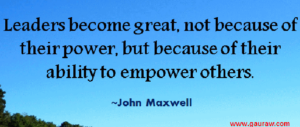
A few years back I did some consulting work with a hospital that wanted to improve the quality of management across the entire organization (admin, doctors, and nurses). They began by administering a survey to all employees, asking them to rate their managers on a number of management and leadership practices.
From the results of the survey, they selected the top seven performers, from approximately 350 administrators/supervisors throughout the hospital, for a special recognition. These men and women were invited to a special banquet and ceremony in which they were honored by the top administrators of the hospital and representatives from the corporation.
I had the privilege of attending the banquet to become acquainted with each of these individuals. In fact, I had been asked to spend the next day at an off-site retreat with them exploring the topic of leadership. Although I did provide some education in leadership principles and skills, my main agenda was to glean from them what made them successful. I considered it a great opportunity to learn from managers who were known to be the most outstanding in their organization.
So, the question was—why, among all the supervisors and administrators within the hospital, were they considered the most effective by the people who reported directly to them? What did they do, in their day-to-day management? What beliefs, practices or skills did they follow? Did anything set them apart? Was it different from each one of them, or were there some common themes in their approach to their jobs that made them so effective?
I asked the questions and then sat back, letting them explore these questions among themselves. At the beginning of the day, the answers were quite unclear. As a matter of fact, a number of them couldn’t get over the fact that they’d been rated highly and had been invited to participate in this event. They hadn’t really considered that they were all that much better than their peers.
But we pressed on with the conversation. Each had plenty of air-time to talk about their management “philosophies” and practices. As the day went on, they began to quiz and learn from each other, grateful for an opportunity to step back and reflect on their leadership and its consequences on their employees.
By the end of the day, the group of seven had come to agreement on a handful of leadership practices which they believe made them successful. There was particularly strong consensus on the top three.
1. Share information widely
They agreed with each other about the importance of sharing information widely. They were not information bottle-necks but continually passed along what they knew to members of their teams or work groups. Be it related to a patient, department performance, changes in corporate strategy or policy, what was going on in another department. It didn’t matter. These supervisors did their best to keep their employees informed and knowledgeable.
2. Think “us”
A second practice around which they agreed quite strongly was thinking in terms of “us.” They would go to the people in their departments and say “We have a problem,” not “I have a problem.” Metaphorically speaking, they had a way of getting the monkey off of their own shoulders and plopping it in the middle of the table for others to pick up. Results were about “us” not “me.” Problems were “ours” not “mine,” or “yours” for that matter. They recognized that their responsibility was not primarily to solve problems and achieve results but create the context in which others felt the ownership and incentive to do so. By so doing, they were able to create an atmosphere in which others were committed and engaged in contributing to organizational outcomes.
3. Address sensitive issues immediately
A third practice is that they figured out that they were all quick to address conflicts, sensitive issues, or performance problems. They didn’t believe in sweeping such matters under the carpet. If they had a concern, they were direct in surfacing and resolving it. However, they also agreed that they didn’t do so through power (“my way or the highway”). Instead, a number of them stated that they began such conversations with an open mind, wanting to understand the point of view of another. But they were also quite fearless in setting a standard and then working with others toward a resolution, a commitment. Their employees learned to count on them to be honest and direct, but fair.
I learned a lot that day. Three rather simple practices, when you think about it, yet also very powerful in fostering a positive atmosphere among employees. These three leadership practices combine high standards with a high respect for people. I do believe that begins to get at the essence of leadership. Both qualities are necessary to get extraordinary performance.
Are you a leader, whether at work, church, community or home? What practices have you found most effective with those you lead?

Great understanding of the Human experience. Don Friel
Thank you Don.
I like very much how team work “empowers others.” What a difference can occur when we work together without trying to build power for self!
Yes. How much better we are when we think us and not me.
Definitely, Team Work and “us” approach instead of “I” makes the change.
Very much practical and informative.
Thank you for sharing.
Thanks, Milind. I’m glad you found the article informative. As you point out, a more collaborative approach works much better in today’s business world.
Thank you for sharing these outcomes!
You are welcome. I hope they are helpful in your leadership.